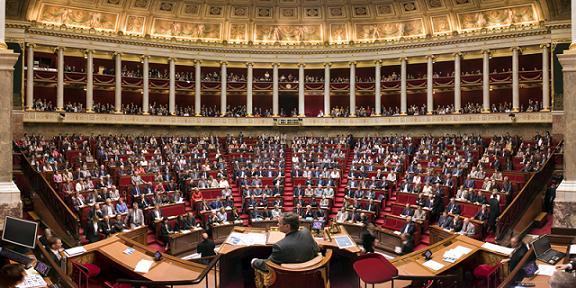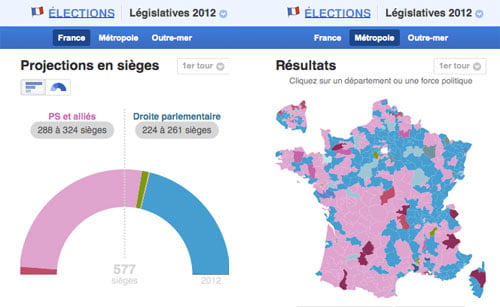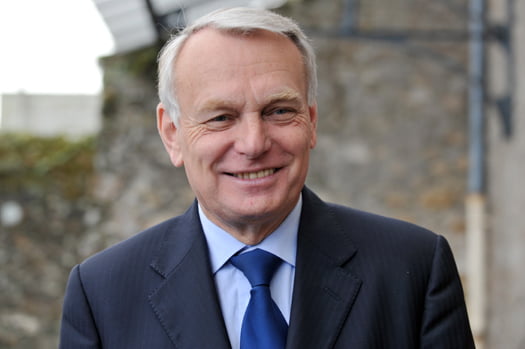Series: 10 steps in 100 days – The French vote again
A new battle is taking place in France (until June 17) as the French elect their 14th National Assembly. The challenge for the new French government? To attain the Parliamentary majority needed for strong support of its change project. The first round has reopened the hostilities. The message from the French people is clear.
The French Parliament consists of two assemblies, the French National Assembly and the Senate. They sit in two distinct premises in Paris: the Palais Bourbon and the Palais du Luxembourg respectively.
Members of Parliament (MPs) and Senators are national representatives. The Senate is made up of 348 Senators, elected for six years, half of which are renewed every three years.
The National Assembly is made up of 577 MPs, elected for a five-year mandate by direct universal suffrage. Thus the French were called back to the ballot boxes just a month after their new government had started to work, to sort out more than 6,000 local candidates.
The first round
The voting results on Sunday June 10 are in favour of the left-wing parties, who have a total of 46.7%. The right-wing party received 34.6% and the extreme right 13.6%.
Mobilising the voters is always a challenge for this type of election; only 57.23% of them participated in the first round.
They have a different relationship with their representatives at Parliament as these are often also their local politician, mayor or regional councillor. In some areas, the battle was fierce with the so-called Mouvement Bleu Marine, the new name of the extreme-right party headed by Marine Le Pen. Still, they should not win more than two seats at the National Assembly.
If the French confirm their choice in the second round on June 17, the Presidential majority of the Socialists will give François Hollande some peace of mind.
Six happy French ministers
A few ministers chosen by the President and the Prime Minister to form the new government were amongst the MPs to be reelected by the people. This is like a second examination for them, in their own region, depending on the vote of their closest citizens.
François Hollande made it mandatory that if a minister does not get elected at this regional level, he or she would have to leave the government. Naturally the local opponents of new branded Ministers are putting on all the pressure possible till the second round.
The happy ministers elected by more than 50% of their voters in the first round are¹:
- Jean-Marc Ayrault (pictured above), the Prime Minister, with 56.21% in Loire Atlantique
- Laurent Fabius, the Minister of Foreign Affaires with 52.81% in Seine Maritime
- Victorin Lurel, the minister of Outre-mer with 67.23% in Guadeloupe
- Frédéric Cuvillier, delegate minister for Transportation with 50.66% in Pas-de-Calais
- Delphine Batho, delegate minister for Justice, with 53.18% in Deux-Sèvres
- Bernard Cazeneuve, delegate minister for European Affaires, with 55.39% in La Manche.
All the others will have to wait for the second round of this election to know for sure that they can stay in the government. 14 of them have good chances as they are in a favourable ballotage with their opponent candidates.
Only one region, the Tarn-et-Garonne, will see Sylvia Pinel, delegate minister for commerce and tourism, duel with the young niece of Marine Le Pen. Finally, the minister of Economy and Finances Pierre Moscovici, will have to face two candidates from the right in the Doubs region.
How important is it for citizens to be involved in the election of the National Assembly? Should voting be mandatory? Share your thoughts with us, below.
Read more from this series on the first 100 days of the new French President:1. First and last steps of a French President
2. Ten milestones in 100 days for a new French President
3. Diversity and parité in the new French government
4. Is change coming for France?
5. The French vote again (this page)
6. The ‘normal’ President of France
7. The French President’s agenda
8. Happy birthday Mr. President!
9. Keep smiling, François!
10. Back in the heat of French politics References:
1. FranceTV info Image Credits:
1. National Assembly, via BFM Business.
2. Les Résultats, via FranceTV info.
3. Jean-Marc Ayrault, AFP via RMC.fr.









